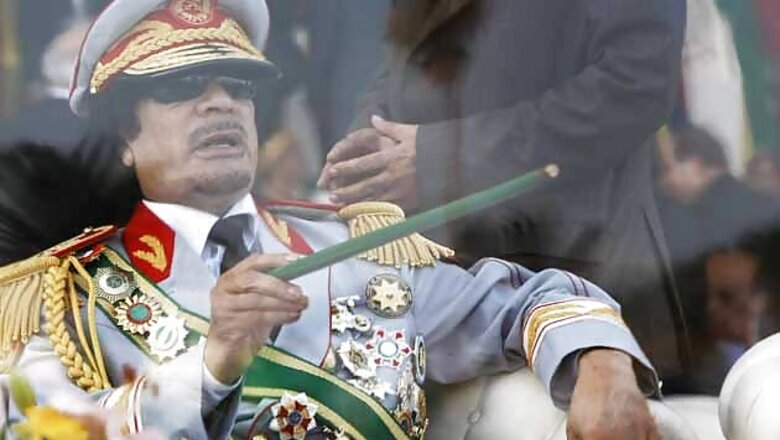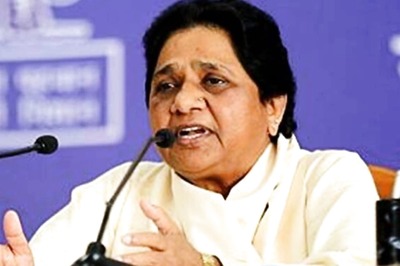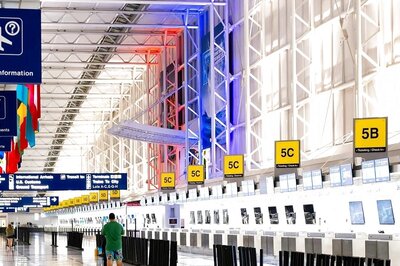
views
Washington: Among all countries swept by the Arab Spring uprisings, few today are as dysfunctional as Libya.
Heavily armed militias outgun its fledgling army. A renegade former general has launched a purge of radical Islamists. Weapons looted from arsenals of ousted dictator Muammar Gaddafi help fuel the bloody conflict in Syria. And an estimated $30 billion in oil revenue has been lost in the past 11 months.
As Libya's problems deepen, US officials suggest it's largely up to Libya to resolve them, underscoring a "hands off" approach that carries risks for the region and the West.
Libyans head to the polls on Wednesday for the country's second national election since the 2011 ouster of dictator Muammar Gaddafi.
Some experts fear some militias or other groups could reject the results of the vote, worsening infighting and potentially deepening the chaos that threatens to transform the North African oil producer into a transit point for fighters heading to conflicts in Egypt, Syria or sub-Saharan countries like Mali.
Asked if US policy toward Libya was likely to change significantly, one US official replied: "No."
"There is an acknowledgement that there is only so much we can do," said the official, who spoke on condition of anonymity.
Growing anxiety about Libya stands in contrast to October 2011 when the White House trumpeted its eight-month campaign to oust Gaddafi. "There will be difficult days ahead. But the United States, together with the international community, is committed to the Libyan people," President Barack Obama said then.
Today, Libya is dominated by armed tribesmen and Islamists who helped topple Gaddafi but now defy state authority.
Weapons looted from Gaddafi's arsenals are winding up in other parts of the Middle East, US officials say. Some, they said, have ended up in Syria, where they may be in the hands of fighters from the Islamic State in Iraq and the Levant who have seized vast swathes of northern and western Iraq.
"Since the collapse of the Gaddafi regime in 2011, weapons from Libyan stockpiles have shown up in a number of conflict areas, including Syria," a second US official said.
PARALYZED
In Washington, policy-making on Libya has been stymied by political fighting over the September 11, 2012, attack on a US diplomatic outpost in Benghazi, which killed an American ambassador and turned Libya and its second-largest city into Republican bywords for Obama administration missteps.
Because the White House and Congress "have been at each other's throats on this, it's completely paralyzed efforts within the (US) government to come to consensus" about what to do, said a Western diplomat who spoke on condition of anonymity.
One tactic that has been tried in recent weeks is the deployment of special envoys, including Britain's Jonathan Powell and veteran US diplomat David Satterfield, to try to push Libya's factions toward political compromise.
There are plenty of signs of Libya's political dysfunction since the civil war that led to Gaddafi's fall.
Officials have been struggling to impose order ahead of Wednesday's parliamentary polls. Two men claimed to be prime minister last month but, after courts stepped in, acting Prime Minister Abdullah al-Thinni prevailed. Parliament has failed to approve major infrastructure programs or overhaul basic laws.
A renegade ex-general, Khalifa Haftar, has rallied a diverse coalition of eastern tribes and former army officers in a rogue bid to sideline Islamist militants and their political allies.
Washington has yet to train a single soldier for a proposed "General Purpose Force" designed to protect Libya's weak central state. Last month, it quietly cut its skeleton diplomatic staff in Tripoli and urged private US citizens to leave.
There is no guarantee greater Western manpower and money would have made a difference in Libya. One US official said it was unclear the United States could have helped Libya better emerge from Gaddafi's 42-year hardline rule.
"This has been a difficult, painful transition ... but, is there a civil war today?" said the official, who declined to be identified because he was not authorized to speak with the media. "It's not Syria," he said.
VICTIM OF THE INSTABILITY
Last year, the United States, Britain, Italy and Turkey committed to train up to 20,000 members of the "General Purpose Force", but US training in Bulgaria has not begun. Part of the problem is money. Libya has not made the bulk of payments promised to the United States for the training, which may cost $600 million, say US officials.
"It's just a victim of the instability," said one US official. Libya has also failed to nominate properly vetted men for the training, officials said.
Other US efforts to help bolster Libya's ability have fallen victim to Libya's descent into lawlessness. A US -led training effort within Libya, for instance, was derailed last August when militants raided a training base near Tripoli and looted weapons, vehicles and other equipment.
The administration is now quietly launching a new program to train and equip Libyan special forces, along with support units and border security officials, a US defense official said. The numbers are small and it will be take place outside Libya due to security concerns.
That training is a modest addition to an overall aid program that represents just a tiny fraction of what Washington spent on state-building in Iraq and Afghanistan.
In the fiscal year to Sept. 30, US foreign assistance for Libya was estimated at $6 million. In contrast, spending by the US aid agency alone hit $3.5 billion a year at the height of US involvement in Afghanistan.
"We've done what we feel we can, within the resources we have," said one Western diplomat on condition of anonymity. "In the end it is a Libyan process: we are always only in the position of advising and corralling. It's their country."



















Comments
0 comment